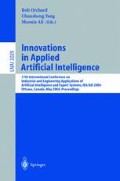Abstract
Each expert system provides its users with a great amount of knowledge of a domain. Moreover, a friendly system-user interface usually guarantees an easy access to this knowledge. However, an expert system is sometimes too slow to serve its purpose.
Most of expert systems are being implemented as rule-based systems with uncertainty (uncertain knowledge, inexact reasoning). There are a few methods of certainty factors calculation. The well known Dempster’s rule of combination always gives a result which is precise and independent of a strategy of conflict resolution. In this paper, we propose a new method, called the rule of convergence. Giving an approximate final result, it can significantly speed up the whole process of reasoning.
The methods of uncertain knowledge representation and the methods of inexact reasoning are willingly implemented in medical expert systems. The rule of convergence can really raise their standard of efficiency.
Access this chapter
Tax calculation will be finalised at checkout
Purchases are for personal use only
Preview
Unable to display preview. Download preview PDF.
References
Deutsch, T., Cramp, D., Carson, E.: Decision, Computers and Medicine: The Informatics of Pharmacotherapy. Elsevier, Amsterdam (2001)
Jankowska, B.: Zastosowanie metod inżynierii wiedzy w prognozowaniu efektów leczenia astmy oskrzelowej, in: Proc. IV Krajowa Konferencja Naukowa SzI-15 2000 Siedlce - Warszawa, Poland, 341-348 (September 2000)
Musen, M., et al.: OPAL: Use a Domain Model to Drive an Interactive Knowledge-Editing Tool. International Journal of Man-Machine Studies 26, 105–121 (1987)
Ogólnoświatowa strategia leczenia astmy oskrzelowej i jej prewencji. Raport NHBI/WHO National Institutes of Health, Publication Number 95-3659 (January 1995)
Orchard, R.A.: FuzzyCLIPS Version 6.04A. User’s Guide National Research Council, Canada (October 1998)
Shortliffe, E.: Computer-Based Medical Consultations: MYCIN. American Elsevier, Amsterdam (1976)
Wróbel, S.: Zastosowanie metod inżynierii wiedzy w procesach prognozowania Master’s Thesis, Poznań University of Technology, Poznań (July 2000)
Author information
Authors and Affiliations
Editor information
Editors and Affiliations
Rights and permissions
Copyright information
© 2004 Springer-Verlag Berlin Heidelberg
About this paper
Cite this paper
Jankowska, B. (2004). How to Speed Up Reasoning in a System with Uncertainty?. In: Orchard, B., Yang, C., Ali, M. (eds) Innovations in Applied Artificial Intelligence. IEA/AIE 2004. Lecture Notes in Computer Science(), vol 3029. Springer, Berlin, Heidelberg. https://doi.org/10.1007/978-3-540-24677-0_84
Download citation
DOI: https://doi.org/10.1007/978-3-540-24677-0_84
Publisher Name: Springer, Berlin, Heidelberg
Print ISBN: 978-3-540-22007-7
Online ISBN: 978-3-540-24677-0
eBook Packages: Springer Book Archive

